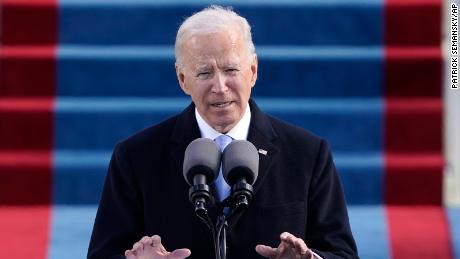
US-China tech rivalry will likely continue under Biden presidency. Here's why
Hong Kong (CNN Business)A major Chinese oil company that has traded on Wall Street for decades has become the latest casualty of tensions between Washington and Beijing.
The New York Stock Exchange announced Friday that it will delist CNOOC (CEO), China’s third largest oil company and its largest offshore oil producer. Shares in the firm will stop trading from March 9.
The exchange said it was aiming to comply with an order former President Donald Trump signed in November, which bans Americans from investing in firms that the US government suspects are either owned or controlled by the Chinese military.
It’s the fourth Chinese company to be slapped with such a punishment. The exchange said in January that it would end trading of shares in China Mobile, China Telecom and China Unicom to comply with Trump’s order. They have since ceased trading.
CNOOC has traded in New York since 2001. It said Sunday that it “regrets” the NYSE decision, and warned in a filing to the Hong Kong Stock Exchange that the delisting may affect share prices and volumes. It added that it would “closely monitor” any developments.
CNOOC’s Hong Kong-listed shares dropped 1.1% on Monday.
The move isn’t the first time that CNOOC has been targeted by Washington. Days before Trump left office in January, the US Commerce Department added the company to a list that effectively cut it off from American supplies and technology. At the time, former Commerce Secretary Wilbur Ross called the firm a “bully” for China’s military, and claimed that it has harassed offshore oil and gas exploration in the South China Sea by other countries.
Beijing has repeatedly blasted such restrictions as an abuse of power by the United States.
The decision to delist CNOOC suggests that Washington is still willing to pressure Beijing in some areas as President Joe Biden begins his term in office.
Last month, the Biden administration stressed that the new president wants to stay tough on China. In a call with Chinese President Xi Jinping, Biden “underscored his fundamental concerns about Beijing’s coercive and unfair economic practices, crackdown in Hong Kong, human rights abuses in Xinjiang, and increasingly assertive actions in the region, including toward Taiwan,” according to the White House.
And while Biden has struck a more predictable and diplomatic tone than his predecessor, analysts have also pointed out that he isn’t likely to ease up on tackling China over tech and trade.
Source: Read Full Article
